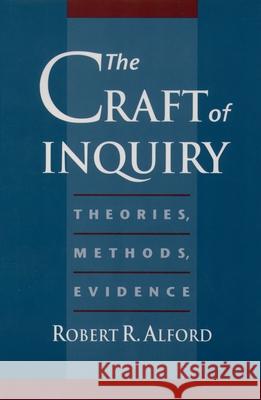The Craft of Inquiry: Theories, Methods, Evidence » książka
The Craft of Inquiry: Theories, Methods, Evidence
ISBN-13: 9780195119039 / Angielski / Miękka / 1998 / 176 str.
Sociology is a challenging discipline, ripe with exciting possibilities. It offers sociologists the chance to choose multiple theoretical and methodological traditions that offer a full range of important questions and ways to answer them. A long standing complaint of many sociology professors, however, is that their students seem to have difficulty moving from problem formation to a theoretical approach and then onto an appropriate research design.
In his provocative new book, Robert Alford proposes that the starting point for any researcher in the process and craft of inquiry should begin with an understanding of how to translate elements of his/her own history, personal experience, and issues, which can then be formulated into research questions. Alford presents three basic explanatory approaches to sociology -- multivariate, interpretive, and historical -- as well as examples of each from such luminaries as Durkheim, Goffman, Weber, Marx, and William Julius Wilson. Upon critical examination, Alford finds each of these three approaches either oversimplified or incomplete. To fill this gap, Alford proposes a tripartite approach that examines each approach through the lens of the other two and analyzes the ways these three models of explanation work and relate to one another. The text is intended to show students how research emerges from, and interacts with, theory. It is designed to help students formulate, reformulate, and pursue their own theoretically informed research, as well as provide them with the tools necessary for critically reading the research of others. Using selected examples from both classic and contemporary studies, Alford strives to illustrate the artistic, rather than formulaic, side of research design and presents several ways that research questions can be framed. He also offers a "working vocabulary" to guide novice researchers through the maze of the process. Full of direct, lucid, and informative accounts of actual research efforts, The Craft of Inquiry is engaging and important reading for any student interested in developing strong, effective social research skills, and in becoming a better artist of the craft of inquiry.











